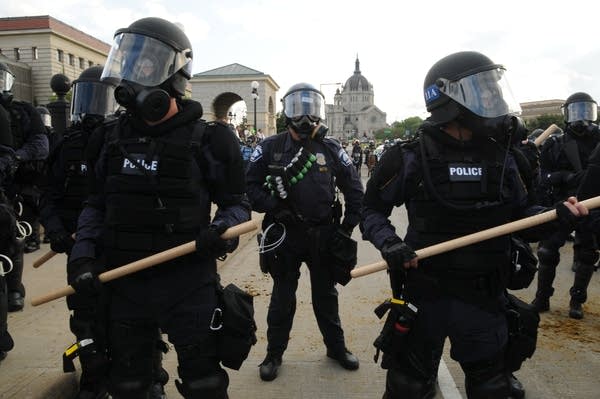RNC's economic impact pegged at $170 million
Go Deeper.
Create an account or log in to save stories.
Like this?
Thanks for liking this story! We have added it to a list of your favorite stories.

One year ago, the Republican National Convention took over downtown St. Paul. Minnesota was hoping to get a $160 million kickstart for its economy from the RNC.
Organizers have now put a final pricetag on the convention's economic impact in a new report out today, and they say the number was higher than they expected -- $170 million.
When the convention was still in its planning stages last year, the city of St. Paul started what it called the Red Carpet Initiative, in an effort to jumpstart retail business in downtown ahead of the convention.
Ed Coleman was one of the Red Carpet participants. He opened the doors of his new optical store, the Spectacle Shoppe, three days before the Republican National Convention began. His store was just two blocks from the convention hall.
Turn Up Your Support
MPR News helps you turn down the noise and build shared understanding. Turn up your support for this public resource and keep trusted journalism accessible to all.
But his business didn't do very well during the RNC. In fact, he said he sold only one pair of glasses that whole week. Obviously, he was hoping for more.
The RNC, and the promise of thousands of visitors eating and shopping in St. Paul, was billed as the opportunity of a lifetime for downtown businesses.
Then the 8-foot steel fences went up around the Xcel Energy Center. Hurricane Gustav threatened the Gulf Coast, and protesters and police battled in the streets of downtown St. Paul, It was not the image convention organizers were hoping to show the rest of the world.

Yet a year later, Ed Coleman is still in business, selling vintage and fashion eye glasses in the Lowry Building downtown. It's one of the seven RNC startups still going. And his shop has actually expanded since the Republicans pulled up stakes last September.
"Of course, every time you want it to be better, and it could probably be better, but its doing well," said Coleman of his business.
In a nutshell, that's the economic impact of the Republican National Convention. It wasn't quite what anyone was expecting, but it turned out OK in the end.
How OK? Convention organizers say the final economic impact totalled $170 million. About 60 cents of every dollar went to pay wages to everyone from electricians to Web programmers to bus cleaners.

Dave Brennan, a marketing professor and co-director of the Center for Retailing Excellence at the University of St. Thomas in St. Paul, wrote the report. He spent three months following the money from the RNC.
He looked at at long list of factors in calculating that total, including such things as the cost of the convention complex; the production of the things that went into the convention; the office space; the technology and telecommunications; sales tax receipts; entertainment tax receipts; transportation and accomodations.
Brennan added it all up, then used a multiplier to calculate secondary spending, to get the $170 million total.
That's more than the $160 million or so organizers predicted they'd get, but quite a lot less than the estimated $266 million impact of the Democratic Convention in Denver last summer, which was held the week before the RNC.

But both 2008 convention host communities did a great deal better than Boston, which hosted the Democratic Convention in 2004 and netted a mere $14 million.
Estimating economic impacts of big events is an inexact science.
Brennan says he used a financial model favored by Minnesota's Department of Employment and Economic Development -- which is more conservative than the model used in Colorado.
It's also hard to know, for example, what might have been spent without the Republican convention. And some places, like restaurants in the shadow of the Xcel Energy Center, were hurt by tight security.
But local backers say the math isn't finished on the impact of the Republican convention. They say the attention the Twin Cities received -- from news programs and bloggers and cable TV -- will have a lasting impression that can't be bought.

"It really built our resume as a community," said Erin Dady, marketing director for the City of St. Paul.
"As we go to pitch future events for years to come, we can say we hosted the second biggest event in the world," said Dady. "That's already been helpful to our community in pitching events like the Cirque de Soleil, or the dentists' convention that comes to the RiverCentre. It gives great confidence to the community, and also to people deciding where to bring their event."
Convention organizers say they expect see some of last year's visitors come to the area again.
Jeff Larson was CEO of the host committee that organized the RNC. He says the convention left behind lasting business ties.
"I've heard a number of cases where the companies that participated and were contributors to the convention found lasting effects, even today, as they deal with people from different states that they entertained or worked with or met while they were here," said Larson.
Larson says he expects to wrap up this year with a small surplus, possibly as much as $5 million. He says Republicans hope to donate that money to several Minnesota foundations.





